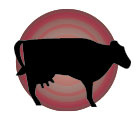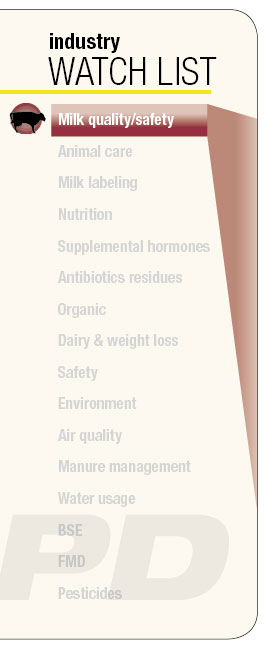The following update is provided by Dairy Management Inc. (DMI), which manages the national dairy checkoff program, and is a producer-funded, nonprofit domestic and international planning and management organization responsible for increasing sales of and demand for U.S.-produced dairy products and ingredients.

In this space a year ago, we discussed the organized campaigns by activist groups to promote raw milk consumption and how the joint industry issues management team (DMI, along with U.S. Dairy Export Council, National Milk Producers Federation, International Dairy Foods Association and Milk Processor Education Program) works to educate the public about the importance of pasteurization and the farm-to-retail food safety system that protects the freshness, quality and great taste of dairy foods.

Raw milk is prominent in the headlines again this spring. In March, at least 20 cases of campylobacteriosis infections were reported by consumers in Michigan, Indiana and Illinois who drank raw milk from a farm in northern Indiana.
A week later, a Wisconsin legislative committee approved a bill that would allow farmers across the state to legally sell raw milk directly to consumers. And the second annual International Raw Milk Symposium was held in Madison, Wis., providing a forum for raw-milk advocates to foment their mission.
While the raw milk advocates are gaining ground in making raw milk more accessible from a legal standpoint, the industry’s position that raw milk doesn’t deliver health benefits beyond those of pasteurized milk remains strongly entrenched with the public health community and the vast majority of consumers. Let’s examine some of the claims and the facts to refute them:
Claim: Raw milk has higher nutrient content than pasteurized milk.
Fact: While pasteurization results in slight reductions in certain nutrients such as Vitamin C, the impact is insignificant – practically speaking. Plus, those who drink raw milk miss out on the vitamin D that’s typically added during processing. Emerging research indicates that vitamin D levels are associated with a reduced risk for developing many major illnesses – including heart disease, diabetes and some types of cancer – and pasteurized milk is the leading source of vitamin D in the American diet.
Claim: Raw milk is easier for those with lactose intolerance to digest.
Fact: Pasteurization does not affect one’s ability to digest lactose, the sugar in milk. The enzyme that breaks it down is found in the cell lining of the small intestine; it is not present in raw or pasteurized milk.
Claim: Raw milk is less allergenic.
Fact: Milk proteins cause some people to have allergic reactions, and the same milk proteins are present in both raw and pasteurized milk.
Claim: Drinking raw milk prevents or cures diseases.
Fact: Such claims are only supported by anecdotal evidence.
Over the years, U.S. dairy farmers and processors have built a stellar reputation for providing safe and high-quality milk products, and that’s jeopardized each time untreated milk causes illness. That’s why it’s crucial to drive home the message that pasteurized milk offers all the same benefits as raw milk, without the risks. PD
Dairy topic watchlist
Low-impact
The direct management impact on producers is minimal, though these issues do directly affect perceptions about dairy products.
Medium-impact
The direct impact on individual producers and their management options will be moderate. However, the issue could directly affect producers and dairies as a whole.
The following update is provided by Dairy Management Inc. (DMI), which manages the national dairy checkoff program, and is a producer-funded, nonprofit domestic and international planning and management organization responsible for increasing sales of and demand for U.S.-produced dairy products and ingredients.
High-impact
These issues directly impact individual producers and their management options.
Should I respond?
Yes. You can help educate the public about your role in the farm-to-dairycase food safety system that protects the freshness, quality and great taste of dairy foods.
All milk intended for direct consumption should be pasteurized – it’s a matter of food safety.
The dairy industry, the Centers for Disease Control (CDC) and the U.S. Food and Drug Administration (FDA) recommend that no one consume unpasteurized milk.
Pasteurization is a simple, effective method to kill harmful pathogens. It does not affect the nutritional value of milk in any meaningful way.
Since its introduction over a century ago, pasteurization has been recognized around the world as an essential tool for ensuring that milk and dairy products are safe.
According to health experts, pasteurized milk offers the same health benefits as raw milk, without the risks.
Test your answer
If you and your family drink raw milk from your farm, why shouldn’t I?
ANSWER: Health experts believe farmers develop immunity over time to germs that may be present on our farms, but it’s not a good idea for others to drink raw milk. Pasteurization is a simple, effective method to kill the harmful bacteria that can potentially grow in raw milk.
Let me tell you what I do on my dairy to ensure the safety and purity of our milk … (insert personal examples).

Related resources
Dairy Farming Today quality and safety information:www.dairyfarmingtoday.org/DairyFarmingToday/Quality-And-Safety
Raw Milk Fact Sheet:
www.dairyfarmingtoday.org/NR/rdonlyres/2E37A9B5-19FD-4C79-9F41-48FA7FC8ECAF/0/RawMilkFactSheet.pdf
National Dairy Council’s Food Safety Fact Sheet:
Real Raw Milk Facts Working Group: www.realrawmilkfacts.com
U.S. Food and Drug Administration’s raw milk questions and answers:
www.fda.gov/Food/FoodSafety/Product-SpecificInformation/MilkSafety/ucm122062.htm
USA Today:
www.usatoday.com/news/health/2010-04-15-rawmilk15_ST_N.htm
Weston A. Price Foundation, advocates of raw milk:
Farm-to-Consumer Foundation, advocates of raw milk:
www.farmtoconsumerfoundation.org




